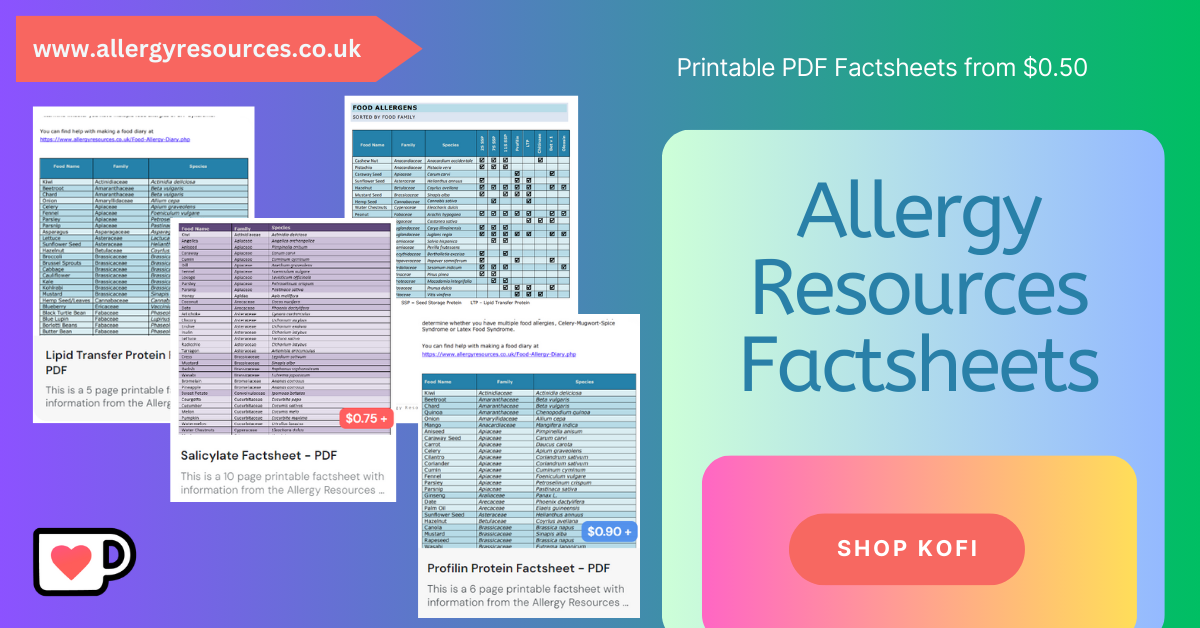
FODMAP INTOLERANCE
This is very simplified information about FODMAP intolerance – there are more resources available at the end of the page for further reading for those who are interested in knowing more.
If you are interested in which foods are safe and which to avoid you can buy a FODMAP Factsheet from the Allergy Resources Ko-fi Shop for just $0.90 (£0.69 or €0.82).
The food list on this page is not exhaustive, the Cross Reactivity page will have the most up to date food lists. You can read more about any of these foods from the dedicated Food Allergy Index
FODMAPedia
ACS - Fermentable Foods: Trouble in Your Diet
Allergy Life Australia - FODMAP Intolerance
Healthpath - NHS FODMAP Complete Guide
BBC Good Food Guide - Low FODMAP Diet
The Role of the FODMAP Diet in IBS, 2024
Effects of a Low-FODMAP Diet on Irritable Bowel Syndrome in Both Children and Adults—A Narrative Review, 2023
FODMAP modulation as a dietary therapy for IBS: Scientific and market perspective, 2022
Effects of a low FODMAP diet on the colonic microbiome in irritable bowel syndrome: a systematic review with meta-analysis, 2022
Efficacy of a low-FODMAP diet in adult irritable bowel syndrome: a systematic review and meta-analysis, 2021
Low FODMAP Diet: Evidence, Doubts, and Hopes, 2020
Controversies and reality of the FODMAP diet for patients with irritable bowel syndrome, 2019
How to institute the low-FODMAP diet, 2017
Controversies and Recent Developments of the Low-FODMAP Diet, 2017
What are FODMAPs?
FODMAP stands for fermentable oligosaccharides, disaccharides, monosaccharides and polyols. They are short-chain carbohydrates that the small intestine doesn’t absorb well. FODMAP diets were created to help people with irritable bowel syndrome (IBS).What causes a FODMAP intolerance?
Most food intolerances are usually the result of a lack of metabolic enzymes. You can read more about them on the Food Intolerance Page. This is not the case with FODMAP foods. Short-chain carbohydrates are essentially sugars. When they are digested, they attract water and then gut bacteria help to ferment them in the digestive system. This is the same for everyone, but people with IBS and other gastrointestinal issues take longer to digest foods for multiple reasons. The sugars sit in the bowel and intestines for longer and cause excessive pain and bloating.Can you be allergic to FODMAPs?
The simple answer is no, they are sugars and not proteins, like a true IgE food allergy. Food intolerances are linked to a dysfunction of the gastrointestinal system. A true food allergy is a dysfunction of the body's immune system.Which are the symptoms of a FODMAP intolerance?
In FODMAP intolerance poor digestion means these sugars ends up in the bowel where normal bacteria interact with it causing painful gastrointestinal symptoms. Symptoms may include:- Abdominal Pain
- Bloating
- Constipation
- Stomach Pain
- Diarrhoea
Which foods contain FODMAP?
FODMAPs are found in lots of foods. They include:- Apple
- Apricot
- Asparagus
- Barley
- Beetroot
- Cabbage
- Cashew
- Cherry
- Date
- Fig
- Garlic
- Grape
- Honey
- Milk
- Peach
- Pear
- Pumpkin
- Soya
- Wheat
If you are interested in which foods are safe and which to avoid you can buy a FODMAP Factsheet from the Allergy Resources Ko-fi Shop for just $0.90 (£0.69 or €0.82).
The food list on this page is not exhaustive, the Cross Reactivity page will have the most up to date food lists. You can read more about any of these foods from the dedicated Food Allergy Index
Are there FODMAPs in animal products?
These types of sugars are usually only found in plant products. Various unprocessed meat products and eggs are ideal for a low FODMAP diet. Dairy products however contain the sugar lactose, which is also a FODMAP food to be avoided. Some dairy products are low in lactose, like hard cheeses, so can be eaten.Are FODMAPs bad, do I need to avoid foods containing them?
No, low FODMAP diets were designed to help improve gastrointestinal symptoms for certain medical conditions and were never intended to be a full time diet to follow. You are meant to reduce high FODMAP foods, then slowly incorporate them back into your diet, removing any that cause problems when reintroduced. A continued low FODMAP diet with no reintroduction attempts of food can lead to a poor diet.Can we inactivate FODMAPs in the food we eat?
Some food allergens can be destroyed by processing, high heat or freezing. Studies have shown that cooking or canning foods containing fructans in particular can reduce the amount of sugar in the food.Further Reading
Healthline - FODMAP 101FODMAPedia
ACS - Fermentable Foods: Trouble in Your Diet
Allergy Life Australia - FODMAP Intolerance
Healthpath - NHS FODMAP Complete Guide
BBC Good Food Guide - Low FODMAP Diet
Articles and Journals
The Efficacy of the Low-FODMAP (Fermentable Oligosaccharides, Disaccharides, Monosaccharides, and Polyols) Diet in Irritable Bowel Syndrome: A Systematic Review and MetaAnalysis, 2025The Role of the FODMAP Diet in IBS, 2024
Effects of a Low-FODMAP Diet on Irritable Bowel Syndrome in Both Children and Adults—A Narrative Review, 2023
FODMAP modulation as a dietary therapy for IBS: Scientific and market perspective, 2022
Effects of a low FODMAP diet on the colonic microbiome in irritable bowel syndrome: a systematic review with meta-analysis, 2022
Efficacy of a low-FODMAP diet in adult irritable bowel syndrome: a systematic review and meta-analysis, 2021
Low FODMAP Diet: Evidence, Doubts, and Hopes, 2020
Controversies and reality of the FODMAP diet for patients with irritable bowel syndrome, 2019
How to institute the low-FODMAP diet, 2017
Controversies and Recent Developments of the Low-FODMAP Diet, 2017